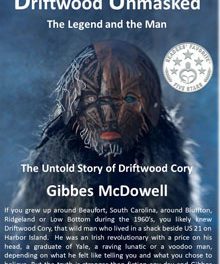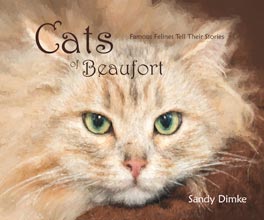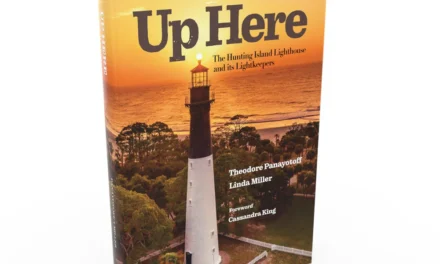 Lowcountry Weekly is pleased to announce the winners of the Sea Island Spirit Writers Short Story Contest. These writers were asked to complete the prompt “Once, when no one was looking…” in 750 words or less. Participation was outstanding, and we’re just glad the Sea Island Spirit Writers served as judges, not us. The winners are as follows…
Lowcountry Weekly is pleased to announce the winners of the Sea Island Spirit Writers Short Story Contest. These writers were asked to complete the prompt “Once, when no one was looking…” in 750 words or less. Participation was outstanding, and we’re just glad the Sea Island Spirit Writers served as judges, not us. The winners are as follows…
1st Place ($100): Peaches, by John G. Williams
2nd Place ($50): My Grandmother’s Voodoo Curse, by Mary Hope Roseneau
3rd Place ($25): Cut on the Bias, by Ginny Hall-Apicella
Honorable Mention ($15): A Thief’s Revenge, by Charlie McKowen
Honorable Mention ($15): The Drive, by Richard Archer
Honorable Mention ($15): Detective James & the Miss Ellie Mystery Case, by Sandra Fischer
Congratulations to you all, and thanks to everybody who participated! And now, without further ado . . . the top three winning stories.
Peaches
By John G. Williams
Once when no one was looking I took a can of peaches. They peaked out at me from the top of Fuller’s pack, black lettering contrasting against the olive green can: “Combat Ration, B, Peaches, 1 each #2061375.” All Marine Corps issue items were like that: Long mixtures of numbers and letters in inverse proportion to the item’s size. The P38 was the worst offender, its fighter plane image giving way to a flat, folding can opener tapped to each Marine’s dog tags, ready to spring in to action against any canned treasure we discovered along the trampled trails that wound beneath Da Nang’s Marble Mountains.
Fuller’s pack was strictly “Old Corps,” made from heavy canvas bleached white by the sun, the type we carried on short patrols like this one, wandering through the boonies, hoping to discourage the “little people” from launching their ancient rockets and blowing up our new airplanes.
Fuller and I were buddies, a strange contrast of a Connecticut Yankee Blueblood and a South Carolina mountain boy thrown together by the Corps and bound by the jungle’s creeping terror and a deep love of history. He was the first really rich person I’d known; though I didn’t know until I spent ten days of leave at his home in Stonington, CT. Stonington reminded me of Charleston but with even narrower streets and more cobblestone alleys.
Here, cocktails were a nightly event, filled with pleasant, lively conversation consisting of personal and daily news, inevitably leading to the brilliant future of Reginald Fuller once that “pot thing” was straightened out at Yale and the “Marine Thing” resolved by a transfer to a more civilized country. I never felt snubbed or jealous. The Fullers possessed a charm that made you feel at home, even though you realized you were outclassed. Reggie was simply a member of America’s next princely class and that was that.
“Walk your point for them peaches,” Corporal Jackson said, squatting next to Reggie. Peaches were the crown jewel of C Rations, their juicy pulp a magic dust-killing potion we all craved by seldom found.
“No thanks,” Reggie answered, shouldering his pack. “Besides, the little people only come out at night.”
Reggie headed up a dusty trail that led us away from the sea and deeper into the jungle. I was next, “walking slack” we called it, when Fuller fired. “Contract front,” I yelled, charging forward, firing from the hip as three black clad figures dropped at my feet, my fate decided by the clouds that floated above Monkey Mountain, cloaking me in their shadows. Fuller and his VC lay curled on the ground, their rifles touching, their arms outstretched like sort of ritual greeting.
We set up a quick perimeter, Doc Harding checking Fuller while Sergeant Jones rolled the VC over with his feet. A brown crocus sack stuffed with rockets and split bamboo was strapped to each back. “Look at that,” Jones said to Lieutenant Harvey who’d finally made it to the front. “Bamboo!” He slid his foot under the nearest VC and rolled him off the trail. “These guys planned to aim these things with bamboo tubes,” he said, his voice a mixture of admiration and disgust. “Next thing you know they’ll be throwing rocks. What a back ass country.”
Harvey glanced at his map, preparing to call for a Huey to evacuate the bodies. “Isn’t that what LeMay told Johnson?” he said, folding the map. “Bomb ‘em back to the Stone Age.”
“Fuller had a different take on that Stone Age thing,” I said, my voice breaking. Harvey, Jones and Harding stared up at me.
“What kind of educated bullshit you college boys come up with?” Jones asked, glancing to see if Lieutenant Harvey took offense at his college remark.
I looked down at Fuller then further up the trail where the VC lay sprawled. “Oh, it was pretty simple,” I answered. “He said that we should declare victory and go home.”
Jones shook his head, a slight smile easing the lines of his hardened face. “You know,” he said. “That just might work.”
Doc Harding slid Fuller’s poncho from his pack, formed a square, then rolled Fuller up like a tightly wrapped joint. I took one last look as Fuller’s head disappeared beneath the rubber covering, bright red blood matting his blond hair. Then I reached down, pulled out the peaches and started walking. Maybe we’d declare victory tomorrow.
My Grandmother’s Voodoo Curse
By Mary Hope Roseneau
Once, when no one was looking, my grandmother put a voodoo curse on her neighbors. She was a widow in Beaufort, SC, measuring 5 feet tall, 215 lbs, a home permanent in her gray hair, an apron always around her waist.
She had a run-down house on Prince Street, near the jail and the Baptist Church.
Life was peaceful until the spring of 1956 when the old colored lady across the street died and the grands moved in. They were wild, with a flashy car they revv’ed loudly, and played music full blast. They threw trash in the street, drank liquor, got into fights and screamed like alley cats.
My grandmother discussed this situation on the partyline. Then she called up her son-in-law for help.
Grandmama didn’t drive so she got Mac to drive her over to St. Helena one evening. “What you need over there, Mrs. Bailey? ”
“I got business that you can’t tell nobody about, under penalty of (she lowered her voice ominously) DEATH.
Mac gulped. This sounded dangerous.
“Where we going?” he asked nervously going over the bridge. “I don’t like this one bit.”
“We’re payin’ a visit to Dr. Buzzard. And don’t give me no look.”
Mac was so shocked he dropped his cigarette onto his pants and frantically put it out before it burned something important.
“Better you don’t ask any questions,” she added.
Mac sighed weakly. “You don’t really believe that stuff, do you? For God’s sake, Mrs. Bailey, you’re a Baptist! “
“It don’t matter what I believe,” she answered darkly.
Dr. Buzzard was a witch doctor on St. Helena and highly respected for his powerful spells. People who wanted a lover back, and other problems, went to Dr. Buzzard for advice and potions.
Mac tried again. “Please, Mrs. Bailey. I don’t want to be a part of no hex business. Let’s forget all about this”.
“Just stay in the car, and keep your mouth shut.”
Mac waited while Ella knocked at Dr. Buzzard’s door. He greeted her cordially, and invited her in. She explained the problem she was having.
“This is easy, Miss Ella,” Dr. Buzzard smiled. He handed her a small cloth bag and gave directions. “Let me know how it goes. Remember, a preacher’s grave is powerful.”
“I thank you most kindly. How much do I owe you?” she asked.
“Not a penny, dear lady. I am honored you came to me,” he replied.
Mac was chain-smoking out in the car. Seeing the bag, he choked. “What’s in there?”
“None of your business. Now, we need us a rooster. You got a dollar?”
Mac reluctantly stopped at the next dirt road , and paid a dollar to a boy who handed him something fighting inside a croaker sack.
“Put it in the trunk,” she ordered. “Next stop, St. Helena Church.”
“What?” Mac stammered.
“ I need dirt,” she retorted.
After checking several headstones she found the one she wanted – Richard Fuller, a preacher.
Looking furtively around, she dug a little hole in the grave with a tablespoon. She deposited the dirt in her hanky, and snapped it in her purse.
The next day was Memorial Day, with marching bands, fish sandwiches, liquor flowing, and dancing. My grandmother was ready.
She slit that rooster’s throat and drained its blood. She gathered Dr. Buzzard’s bag containing bones, feathers, an old brush and her hanky with preacher grave dirt.
Before daylight she crept across the street to paint the doorframe, porch, and mailbox with the blood. She sprinkled the dirt by the door, leaving feathers and bones on top. Then she waited.
About 10 am it broke loose. A scream came from across the street. One of the kids woke up and stumbled out the front door onto the bones, feathers, and dirt. He also saw the blood smeared all over the door and porch.
The rest came running to see what was going on. The women started moaning and pointing at the blood. They started throwing things in the car: clothes, dishes, food, children, anything they could grab. The place was cleaned out in 5 minutes.
My grandmother was rocking in her swing, reading the Gazette, but started giggling. When the car squealed off, she jumped off the swing, and danced a jig.
“Good riddance to bad rubbish,” she sang.
She never admitted it. After she died, however, my mother and aunt went through her things, and found a little sack with dirt, feathers, and assorted bones.
Cut on the Bias
By Ginny Hall-Apicella
Once, when no one was looking, Millie slipped a package of silk stockings into her shopping bag at Chamberlin’s Department Store. These were the finest quality silk with reinforced toe and French heel in Rose Blush for $1.29. Sure, she could have gotten the wool and rayon hose for $.69 from the Sears catalogue but these were special. These were for her date with Jack.
During the weekend Millie worked as a clerk, and sometimes model, at Madame Deville’s Dress Salon. Every spring Madame Deville, whose real name was Doris Finkel, received a package from Paris with a Madame Vionnet and a Schiaparelli dress enclosed. They were sumptuous and sensuous creations, fluid and elegant. Unlike dresses cut on the straight grain with the warp and weft, these were cut on the bias, so they draped and flowed over a woman’s curves and made her feel like Jean Harlow or Ginger Rogers on Fred Astaire’s arm. Madame Deville would have Carmella, the seamstress, make copies of the dresses for her clientele. The customers were the women who didn’t need to work even in the Depression because their husbands were judges or lawyers or politicians. Sometimes the husbands would come to buy their wives “get-out-of-the-dog-house” gifts. Then, Millie got to model Carmella’s version of the Parisian evening gowns and afternoon dresses. Inevitably, when she stepped on the modeling pedestal, the husbands would give an appreciative nod and say, “Say, don’t you look like a young Myrna Loy.”
One week, the package from Paris was delivered by a handsome new young courier who greeted Millie with a “Hey, good lookin’.” Millie blushed as she admitted the brash young man through the back door. He held out his hand. “I’m the new guy from Braddock’s Delivery. John Miller’s the name by friends call me Jack. Call me Jack, darlin’.” Millie felt awkward and self-conscious. She didn’t know many young men except for her brother’s friends, who hardly counted.
Jack continued to talk and finally said, “How about me and you going to a picture show next week? Meet you in front of the RKO at 7:00. Friday.” Millie nodded her head yes. Before he left, Jack turned and said, “Anyone ever tell you, you look like a young Myrna Loy?” Reddening, Millie nodded again. “Well,” said Jack, “people tell me I look like Clark Gable.”
Millie was in heaven; but she needed something Myrna Loy worthy to wear. She went to Chamberlin’s and bought a pattern and dusty rose crepe de chine. This dress would be cut on the bias and would ripple when she walked. Carmella helped her with the caplet sleeves when Madame Deville was out. She was now broke. That’s when she decided she wanted . . . no, needed . . . no, deserved those silk stockings.
As she approached the RKO, Jack let out a low whistle and looked her up and down. “Ain’t you the looker. What a dish! You are one hot mama! And ya look at those gams!” Jack put his arm around her and led her into the dark theater.
After the show, he said, “How about some pie?” Once again, he put his arm around her and steered her to the coffee shop down the street. As they slid into the booth, he said to the waitress, “Two cups of coffee and two pieces of cherry pie. With ice cream. We’re living large tonight.”
They talked about the movie but mostly Jack talked about himself. “I’m a delivery boy now but just wait; soon I’m gonna be the manager and old man Braddock will probably make me president. Yeah, that’s the ticket. You and me’ll get hitched and you’ll sit at home waiting for President Jack to come home and check out those gams. Yeah, no wife of mine’s going to work. You’ll just stat home, have my kids and iron my presidential shirts. Yeah, Myrna and Clark at home together.” Millie smiled. But she hated cherry pie.
Next pay day, Millie rushed to Chamberlin’s and found a clerk.
“Somehow, I don’t know how, these silk stockings landed in my bag. I want to give you the $1.29 for them.”
The clerk looked puzzled and said, “The are lovely, so sheer, so clear.”
Millie answered, “Yes, they are clear. Actually, I think a lot of things are very clear to me now.”
Still puzzled, the clerk asked, “Who are you? What’s your name?”
Millie smiled. “Well, it’s not Myrna Loy.”







